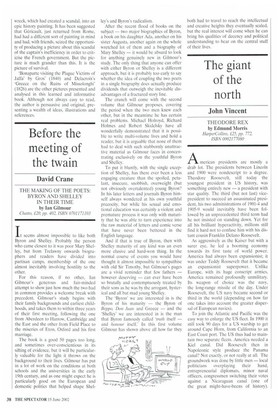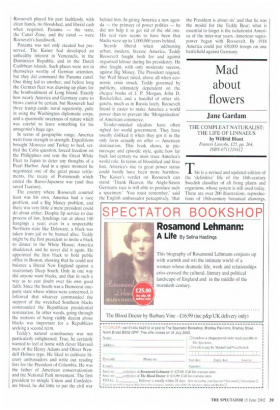The giant of the north
John Vincent
THEODORE REX by Edmund Morris HatperCollins, £25, pp. 772, ISBN 0002177080 Atnerican presidents are mostly a drab lot. The presidents between Lincoln and 1900 were nondescript to a degree. Theodore Roosevelt, still today the youngest president in US history, was something entirely new — a president with star quality. The third (but not last) vicepresident to succeed an assassinated president, his two administrations of 1901-4 and 1905-9 would inevitably have been followed by an unprecedented third term had he not insisted on standing down. Yet for all his brilliant hyperactivity, millions still find it hard not to confuse him with his distant cousin Franklin Delano Roosevelt.
As aggressively as the Kaiser but with a surer eye, he led a booming economy towards its first taste of world power. America had always been expansionist; it was under Teddy Roosevelt that it became an expansionist superpower. Unlike Europe, with its huge conscript armies, America remained profoundly unmilitary. Its weapon of choice was the navy, the long-range missile of the day. Under Roosevelt, the US navy became second or third in the world (depending on how far one takes into account the greater dispersal of European navies).
To join the Atlantic and Pacific was the easy way to enlarge the US fleet. In 1900 it still took 90 days for a US warship to get around Cape Horn, from California to an East Coast port. The US thus had to maintain two separate fleets. America needed a Kiel canal. Did Roosevelt then in Napoleonic style produce the Panama canal? Not exactly, or not really at all. The groundwork was done by little men — local politicians overplaying their hand, entrepreneurial diplomats, minor naval officers, congressmen switching their votes against a Nicaraguan canal (one of the great might-have-beens of history). Roosevelt played his part faultlessly, with clean hands, no bloodshed, and liberal cash when required. Panama — the state, the Canal Zone, and the canal — were Roosevelt's handiwork.
Panama was not only created but preserved. The Kaiser had developed an unhealthy interest in Venezuela, in the Dominican Republic, and in the Dutch Caribbean islands. Such places were not in themselves worthy of German attention, but they did command the Panama canal. One thing led to another, and before long the German fleet was drawing up plans for the bombardment of Long Island. Exactly how nearly America and Germany came to blows cannot be certain, but Roosevelt had three trump cards: naval superiority, guile in using the Washington diplomatic corps, and a spasmodic sweetness of nature which was careful to leave something for his antagonist's huge ego.
In terms of geographic range, America went from strength to strength. Expeditions brought Morocco and Turkey to heel, settled the Cuba question, forced freedom on the Philippines and sent the Great White Fleet to Japan to deter any thoughts of a Pearl Harbor. And in a spare moment he negotiated one of the great peace settlements, the treaty of Portsmouth which ended the Russo-Japanese war (and thus saved Tsarism).
The country where Roosevelt counted least was his own. America had a race problem, and a Big Money problem, and there was very little a mere president could do about either. Despite lip service to due process of law, lynchings ran at about 100 hangings a year; even in a respectable Northern state like Delaware. a black was taken from jail to be burned alive. Teddy might be the first president to invite a black to dinner in the White House; America shuddered, and he never did it again. He appointed the first black to hold public office in Boston, showing that he could not balance a liberal New England against a reactionary Deep South. Only in one way did anyone want blacks, and that in such a way as to cast doubt over his own good faith. Since the South was a Democrat oneparty state where whites were concerned, it followed that whoever commanded the support of the wretched Southern blacks commanded the Republican presidential nomination. In other words, going through the motions of being visibly decent about blacks was important for a Republican seeking a second term.
Teddy's natural constituency was not particularly enlightened. True, he certainty wanted to feel at home with clever Harvard men of the Henry Adams and Oliver Wendell Holmes type. He liked to cultivate literary ambassadors and write out reading lists for the President of Columbia. He was the father of American conservationism and the National Park movement. The first president to mingle Union and Confederate blood, he did little to put the civil war
behind him. In giving America a new agen da the primacy of power politics — he did not help it to get rid of the old one. His real view seems to have been that blacks were up to 1,000,000 years behind.
Sternly liberal when addressing urban, modern, literate America, Teddy Roosevelt fought both for and against organised labour during his presidency. He also fought, with only moderate success, against Big Money. The President reigned, but Wall Street ruled, above all when economic crisis struck. Teddy governed by publicity, ultimately dependent on the cheque books of J. P. Morgan, John D. Rockefeller, and a handful of other oligarchs, much as in Russia lately. Roosevelt found it easier to make America a world power than to prevent the `Morganisatione of American commerce.
Tender-minded idealists have often sighed for world government. They have usually disliked it when they got it in the only form actually on offer — American domination. This book shows, in picturesque and episodic style, quite how far back last century we must trace America's world role. In terms of bloodshed and lives lost, America's rise to great power status could hardly have been more harmless. The Kaiser's verdict on Roosevelt can stand: 'Thank Heaven, the Anglo-Saxon Germanic race is still able to produce such a specimen.' You must remember,' said the English ambassador perceptively, 'that the President is about six' and that he was the model for the Teddy Bear; what is essential to forget is the isolationist America of the inter-war years. American superpower began with Roosevelt. By 1918 America could put 430,000 troops on one battlefield against Germany.



































































 Previous page
Previous page